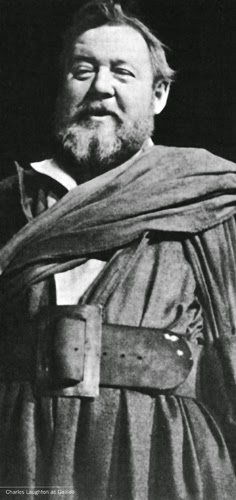Galileo
 Galileo, by Bertolt Brecht
Galileo, by Bertolt BrechtHey, everybody--I've been reading a good bit, but blogging has been just about impossible lately. Still, I've got plenty to tell you and I'm determined to have my say for Elizabeth Goudge Week (starts today!) and Trollope's birthday month (go enter the giveaway!) before it's over.
And now, to Bertolt Brecht's famous play, Galileo...
I've figured it out. It's all Brecht's fault. I blame him. Or at least partly. It's Brecht's fault that everybody thinks that medieval people were anti-science and all that. Because he wrote this play, which shows Galileo kind of knuckling under to the evil Catholic Church because of cowardice, and we've all seen that scene acted out....
But! Brecht wasn't the least bit interested in showing a historically accurate Galileo. In fact, he happily gets a whole lot about Galileo's actual life quite wrong. What Brecht was interested in was using the Galilean legend to comment on the modern world--in the first version, Europe in the 1930s, and later, post-WWII world. The second version is called the 'American' version and is what I read.
As a result, I had a hard time enjoying this play. This is entirely my own fault; lots of people read Galileo and don't worry about stupid stereotypes about medieval people. Oh well, at least I read it.
------------------------------------------
Grumble: just yesterday I was going through some new books at work, and there was a very pretty children's book about astronomical discoveries, Copernicus and so on. Just to see, I looked up Giordano Bruno, and sure enough, he was described as a "scientist" burned alive because he accepted the Copernican theory. Ahem. Bruno was not a scientist. He was a contrarian in almost every way, and liked heliocentrism largely because he was into neo-Platonism and sun-worship, not because he had done the math and weighed the evidence and thought it was a better descriptive model than the Ptolemaic. But that wasn't why he got killed by the Inquisition; there was a whole lot more to it than that. Obviously they shouldn't have burned him, but good golly, get your facts right.




Very interesting ......... From what I know of Galileo, during the time of his punishment, the Pope was very testy because of other issues going on and this probably had an effect on his reaction to Galileo. I also read that during his house arrest, Galileo stayed with an archbishop and had friendly conversations about his scientific ideas with other open-minded Catholics so certainly the whole church wasn't against him, nor were they anti-science.
ReplyDeleteIt's rather concerning that such books as the one you mentioned last are being published. Many of the older children's books I've bought which delve into history, are often written by people who have read extensively on the topic or have brought in an expert. But I have a feeling that the person who wrote that book, wasn't interested in facts.
I love (hate) scouring children's books for truth. Drives me absolutely crazy. I knew this was wrong, but I used to use a pencil while scouring. (I don't do that anymore since I read the sign on the library door that warned anyone defacing library books would be forced to pay for the book. Gulp!) I think authors/editors take for granted that most kids aren't going to fact-check the work.
ReplyDelete